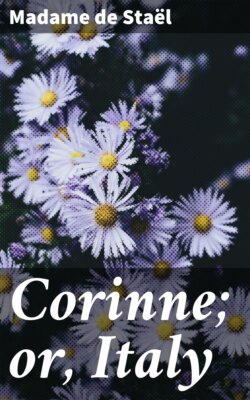Читать книгу Corinne; or, Italy - Madame de Staël - Страница 25
На сайте Литреса книга снята с продажи.
CHAPTER II.
ОглавлениеOswald and Corinne went first to the Pantheon, now called Santa Maria of the Rotunda. Throughout Italy the Catholic hath been the Pagan's heir; but this is the only antique temple in Rome which has been preserved entire; the only one wherein we may behold, unimpaired, the architecture of the ancients, and the peculiar character of their worship.
Here they paused to admire the portico and its supporting columns. Corinne bade Oswald to observe that this building was constructed in such a manner as made it appear much larger than it was. "St. Peter's," she said, "produces an opposite effect: you will, at first, think it less vast than it is in reality. The deception, so favorable to the Pantheon, proceeds, it is conceived, from the great space between the pillars, and from the air playing so freely within; but still more from the absence of ornament, with which St. Peter's is overcharged. Even thus did antique poetry design but the massive features of a theme, leaving the reader's fancy to supply the detail: in all affairs we moderns say and do too much. This fane was consecrated by Agrippa, the favourite of Augustus, to his friend, or rather, his master, who, however, had the humility to refuse this dedication; and Agrippa was reduced to the necessity of devoting it to all the gods of Olympus, and of substituting their power for that of one earthly idol. On the top of the Pantheon stood a car, in which were placed the statues of Augustus and Agrippa. On each side of the portico similar effigies were displayed, in other attitudes; and over the front of the temple is still legible: "Consecrated by Agrippa." Augustus gave his name to the age in which he lived, by rendering it an era in the progress of human intellect. From the chefs-d'œuvres of his cotemporaries emanated the rays that formed a circling halo round his brow. He knew how to honor men of letters in his own day; and posterity, therefore, honors him. Let us enter the temple: it is said that the light which streams in from above was considered the emblem of a divinity superior to the highest divinities. The heathens ever loved symbolical images; our language, indeed, seems to accord better with religion, than with common parlance. The rain often falls on the marbles of this court, but the sunshine succeeds to efface it. What a serene, yet festal air is here! The Pagans deified life, as the Christians sanctify death; such is the distinction between the two faiths; but Catholicism here is far less gloomy than in the north, as you will observe when we visit St. Peter's. In the sanctuary of the Pantheon the busts of our most celebrated artists decorate the niches once filled by ideal gods. Since the empire of the Cæsars, we have scarce ever boasted any political independence; consequently, you will find no statesmen, no heroes here. Genius constitutes our only fame; but do you not think, my Lord, that a people, who thus revere the talents still left amongst them, must deserve a nobler destiny?"—"I believe," replied Oswald, "that nations generally deserve their own fates, be they what they will."—"That is severe! but, perhaps, by living in Italy, your heart may soften towards the fair land which nature has adorned like a victim for sacrifice. At least remember, that the dearest hope the lovers of glory cherish is that of obtaining a place here. I have already chosen mine," she added, pointing to a niche, still vacant. "Oswald, who knows but you may one day return to this spot, when my bust——". "Hold!" interrupted he; "can you, resplendent in youth and beauty, talk thus to one whom misfortune even now is bending towards the grave?"—"Ah!" exclaimed Corinne, "the storm may in a moment dash down flowers that yet shall raise their heads again. Oswald, dear Oswald! why are you not happy?"—"Never ask me," he replied; "you have your secrets, and I mine: let us respect our mutual silence. You know not what I should suffer, if forced to relate my distresses." Corinne said no more; but her steps, as she left the temple, became slow, and her looks more pensive.
She paused beneath the portico. "There," she said, "stood a porphyry urn of great beauty, now removed to St. John Lateran; it contained the ashes of Agrippa, which were deposited at the foot of the statue he had erected to himself. The ancients lavished such art on sweetening the idea of destruction, that they succeeded in banishing all its most dreary and alarming traits. There was such magnificence in their tombs, that the contrast between the nothingness of death and the splendors of life was less felt. It is certain, too, that the hope of another world was far less vivid amongst them than it is with Christians. They were obliged to contest with death, the principal which we fearlessly confide to the bosom of our eternal Father."
Oswald sighed, and spoke not; melancholy ideas have many charms, when we are not deeply miserable; but while grief, in all its cruelty, reigns over the breast, we cannot hear, without a shudder, words which, of old, excited but reveries not more sad than soothing.
